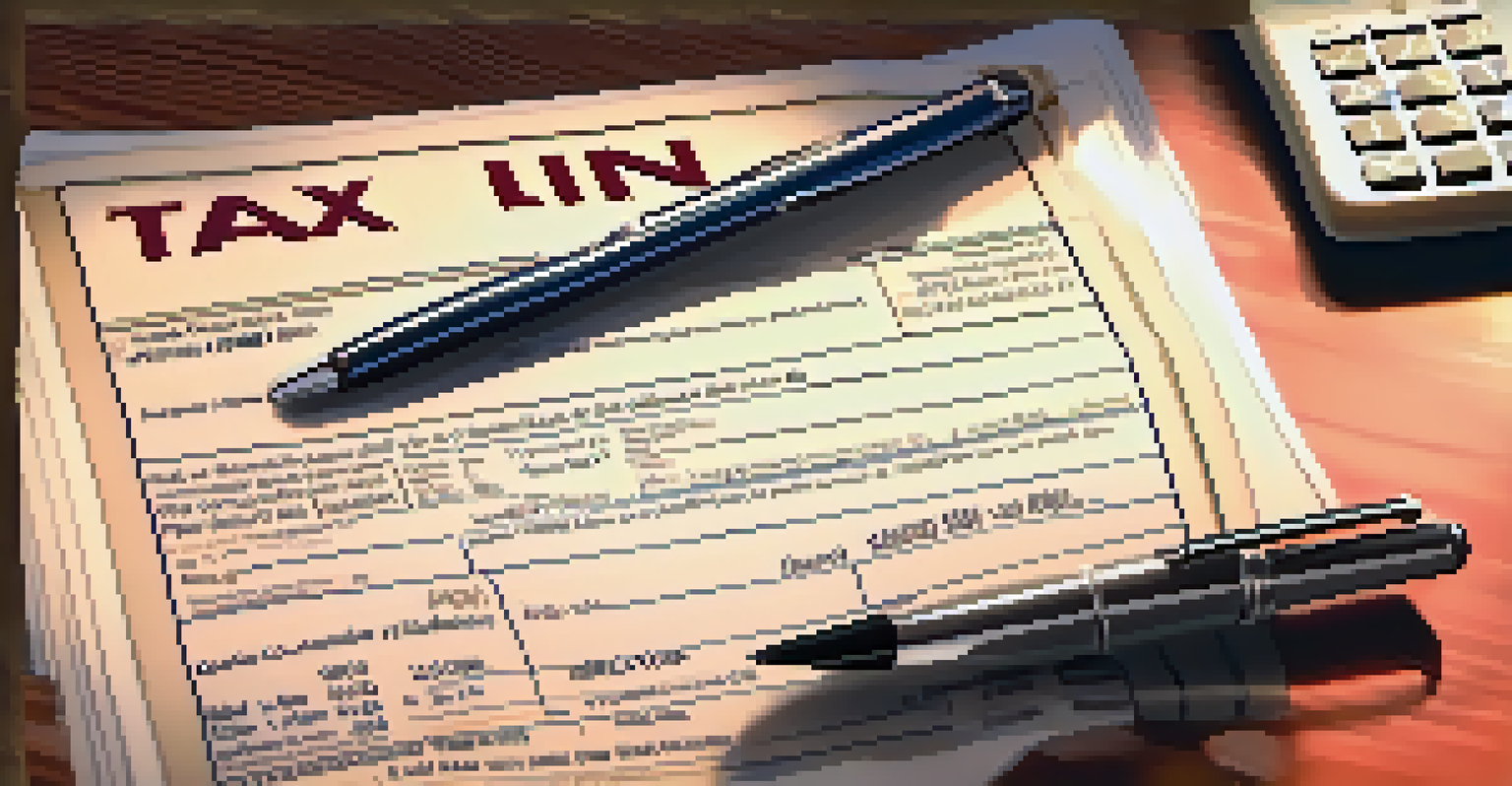How to Respond to a Tax Lien Notice Effectively

Understanding Tax Liens: What You Need to Know
A tax lien is a legal claim by the government against your property when you fail to pay your taxes. It’s essential to understand that a tax lien can affect your credit score and hinder your ability to secure loans. The notice you receive is a formal alert that the government is taking action to recover unpaid taxes, and ignoring it can lead to more severe consequences.
The only thing certain in life is death and taxes.
When you receive a tax lien notice, it may feel overwhelming, but knowing what it entails can help demystify the situation. Essentially, it serves as a warning that your property might be at risk if you don’t address the outstanding tax debt. Understanding the implications of this notice is the first step towards an effective response.
Additionally, tax liens can be placed on various types of properties, including real estate, vehicles, and even personal bank accounts. By grasping the nature of tax liens, you empower yourself to take appropriate actions, ensuring that you don’t let this situation spiral out of control.
Reviewing the Tax Lien Notice Carefully
Once you receive the tax lien notice, the first step is to read it thoroughly. Check for any errors, such as incorrect personal information or inaccuracies regarding the amount owed. If there are discrepancies, addressing these immediately can save you time and stress down the road.

It’s also important to understand the timeline provided in the notice. Often, there will be specific deadlines by which you need to respond or take action. Missing these deadlines can lead to further complications, so make a note of important dates in your calendar.
Understand Tax Liens' Impact
A tax lien can severely affect your credit score and property ownership if unpaid.
Lastly, keep a copy of the notice for your records. This will not only help you track the situation but also provide documentation if you need to discuss the matter with a tax professional or the IRS. Being organized and informed is key to effectively managing a tax lien.
Gathering Financial Documentation
Before you respond to the tax lien notice, it’s crucial to gather all relevant financial documentation. This includes your tax returns, income statements, and any correspondence with the IRS or state tax authority. Having this information on hand will help you understand your tax situation better and prepare for any discussions.
It's not how much money you make, but how much money you keep, how hard it works for you, and how many generations you keep it for.
Additionally, if you believe that you can dispute the amount owed, gathering evidence to support your claim is essential. This could involve collecting receipts, bank statements, or any other documents that demonstrate your financial status or tax payments. The more information you have, the stronger your case will be.
Lastly, consider creating a summary of your financial situation. This will not only help you articulate your position but also assist any tax professionals you may consult. Clarity in your financial documentation can make a significant difference in how your case is handled.
Considering Professional Help: When to Seek Guidance
Navigating a tax lien can be complex, and sometimes it’s best to seek professional help. If you feel overwhelmed or believe the situation may escalate, consulting a tax professional or attorney can provide peace of mind. They can help you understand your options and guide you through the process effectively.
Tax professionals can also assist in negotiating with the IRS or state tax authority on your behalf. This may include setting up a payment plan or disputing the lien if there are valid grounds. Their expertise can often lead to better outcomes than handling the situation alone.
Respond Quickly to Notices
Timely responses to tax lien notices can prevent additional penalties and complications.
If you decide to seek help, ensure you choose someone with experience in tax issues. Look for reviews or ask for recommendations to find a trusted professional. A knowledgeable advisor can make a significant difference in how you respond to a tax lien notice.
Responding to the Tax Lien Notice Promptly
Timeliness is critical when responding to a tax lien notice. Once you’ve reviewed the notice and gathered your documents, draft your response as soon as possible. Delaying your response can lead to additional penalties and complications, so prioritize tackling this issue head-on.
In your response, clearly state your case, addressing any discrepancies or issues you’ve identified in the notice. Be concise but thorough, providing any supporting documentation that reinforces your position. A well-organized response can significantly improve the chances of a favorable outcome.
Finally, consider sending your response via certified mail. This provides you with proof of delivery and ensures that your response is officially logged. Keeping a record of all correspondence is essential in case further communication is necessary.
Negotiating Payment Plans or Settlements
If you owe taxes and can’t pay the full amount at once, negotiating a payment plan or settlement may be a viable option. The IRS often allows taxpayers to set up installment agreements, which can make managing your debt more manageable. This means you can pay off your taxes in smaller, more affordable increments.
When approaching this negotiation, be prepared to share your financial information. The IRS will want to see proof of your income and expenses to determine a reasonable payment plan. Being open and honest about your financial situation can facilitate a smoother negotiation process.
Seek Professional Help When Needed
Consulting a tax professional can provide guidance and improve outcomes when dealing with tax liens.
In some cases, you may qualify for an Offer in Compromise, which allows you to settle your tax debt for less than the full amount owed. This option is typically reserved for those facing significant financial hardship, so consult with a tax professional to see if this is a possibility for you.
Monitoring Your Credit and Future Tax Obligations
After addressing the tax lien notice, it’s essential to monitor your credit report closely. A tax lien can significantly impact your credit score, so keeping an eye on any changes is crucial. You can check your credit report for free annually through various services, allowing you to stay informed.
Moreover, ensure that you fulfill any future tax obligations to avoid similar situations. Staying organized with your finances and filing your taxes on time can prevent new liens from arising. Consider setting reminders or using tax software to keep track of important deadlines.

Lastly, if you’ve successfully resolved the lien and paid your taxes, request a lien release from the IRS. This document confirms that the lien has been satisfied, helping to clear your credit report. Taking these proactive steps can help you rebuild your financial foundation and restore your creditworthiness.